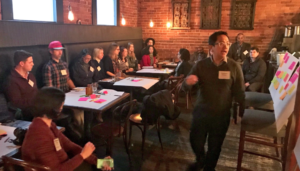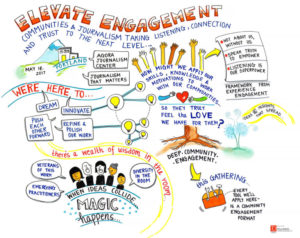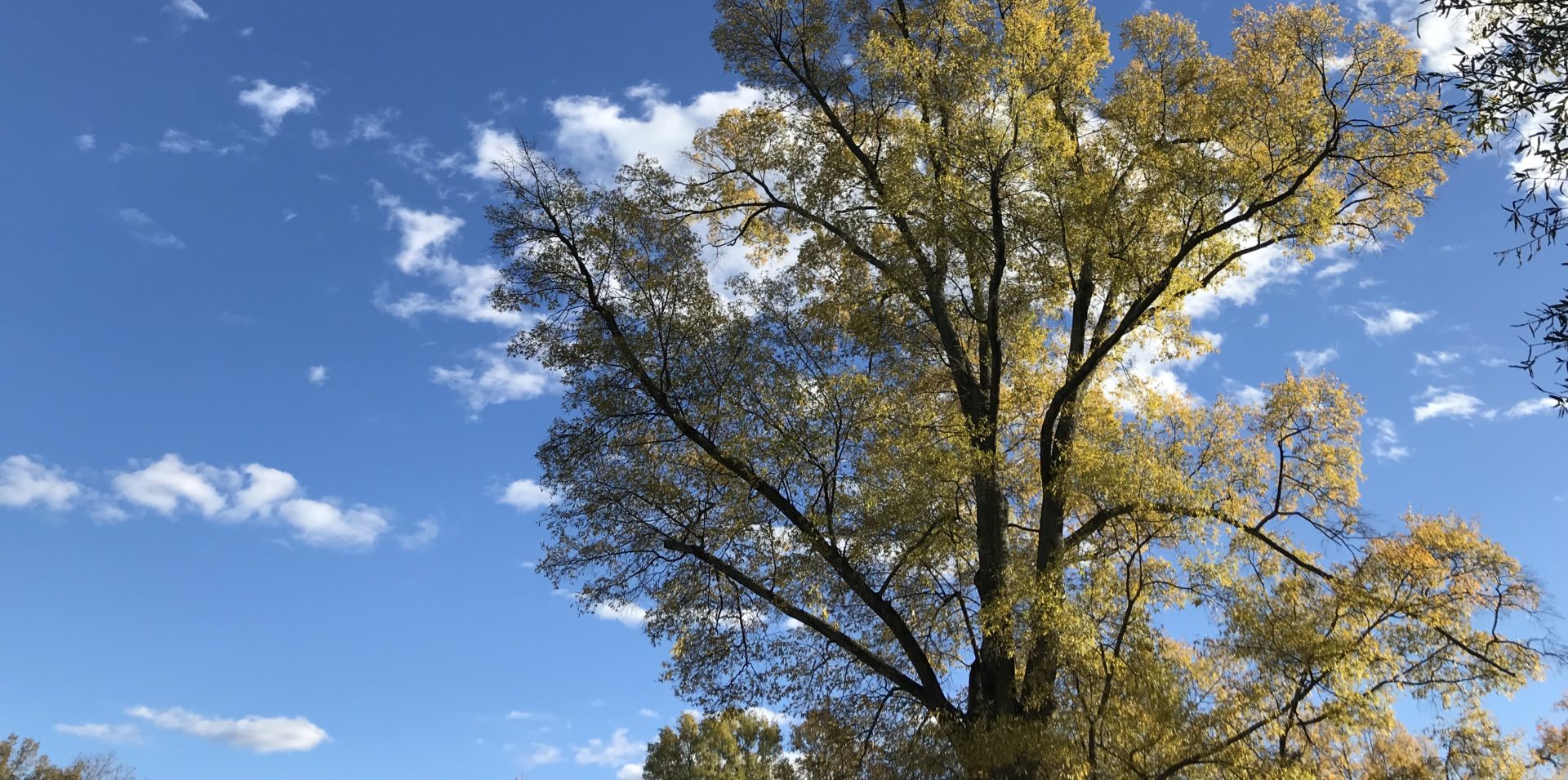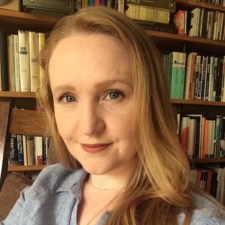“If Only Journalists Care about the Future of Journalism, Democracy is in Trouble”
Frontiers of Democracy, June 2018, Tufts University, Boston
News Voices has been centering the voices of local community members in conversations about journalism’s future that have gone on mostly among journalists and academics. Since we launched in 2015, first in New Jersey and then a year ago in North Carolina, we’ve hosted dozens of public forums, workshops and meetups where we’ve listened to people tell us the importance of local news – how it’s failed them, how it’s helped them, and what they want to see. As community organizers and former reporters advocating for informed communities, we bridge divides newsrooms have not. We use dialogic processes to engage cross-cultural conversations. We urge journalists to think of those they serve not just as an audience, but as a constituency. And we’re mobilizing that constituency: In NJ, to shape and support a Civic Info Bill to use spectrum auction proceeds to fund local news. In NC, we asked organizers, artists, librarians, students and journos what news Charlotte needs to address economic inequality with ground-up rather than top-down solutions. We’ll tackle misinformation in Rocky Mount by mapping information assets in a place many consider a news desert. Communities, not newsrooms, are leading the way.

Creating a Culture of Listening: Using Dialogue to Bridge Divides, invited participant
American Press Institute Thought Leader Summit, March 2018, Nashville
Creating a Culture of Listening: Using Dialogue to Bridge Divides gathered community-minded journalists, editors and nonprofit leaders who are pioneers of listening and dialogue projects in journalism. The event brought together people with a range of titles, all of whom have hands-on experience or big ideas on the ways journalists can better understand and serve the whole of their communities. This summit built on API efforts to support newsroom practices that help news organizations serve the range of diverse audiences in their communities. At a time of eroding trust in news organizations and increasing polarization in politics, part of the solution is for newsrooms to use listening and dialogue to form deeper connections, understanding and trust across communities. At our summit, we held in-depth discussions on how to create organizational cultures that embrace listening, effective strategies for facilitating dialogue among divided community groups, and other topics. Unlike a typical conference, the intimate, interactive summit allows each attendee to be an active participant, sharing their expertise and experiences while gaining actionable insights from others.
Journalism & Media Justice in the South track co-organizer
Free Movement Conference, March 2018, Wilmington, NC
Journalism & Media Justice in the South brings a racial equity lens to issues of media justice and offers participants hands-on engagement and opportunities to make their voices heard in the media. Sessions are designed to be of value both to professional journalists and to those who seek to inform their communities as part of their civic engagement. Session topics include: accessing public records, keeping an eye on the N.C. General Assembly, citizen journalism how-to, the legacy of Black media in North Carolina, transgender narratives in the media, coverage of the Wilmington water crisis, and a workshop for organizers on building transformational relationships with local media. Fellow track co-organizers: Alicia Bell and Rend Smith
See my report back for Free Press on the many components of the conference track.
“Opening Up Journalism: How newsrooms are tapping community knowledge to build relevance and support,” panelist
North Carolina Press Association Annual Convention, February 2018, Raleigh
Melanie Sill, former News & Observer executive editor now working with Democracy Fund’s journalism efforts in NC, leads a show-and-tell session and discussion of how local newsrooms in North Carolina and nationally are using new tools and time-tested ideas to engage audiences more deeply as participants and investors in quality journalism. Fiona Morgan of Free Press shares learnings from the News Voices: North Carolina project, which has convened groups of North Carolinians to learn more about their relationships with local news, and NCPA member work will be highlighted along with national examples. With: Melanie Sill, Mark Schultz
Member of the organizing and facilitation team
Agora Engagement Workshop, January 2018, Charlotte

How might journalists and engagement practitioners learn from each other to build stronger local media ecosystems in North Carolina? This intensive day-and-a-half-long gathering brought together a mix of reporters, editors, producers, librarians, teachers, artists and activists to practice engagement and learn from one another while planting the seeds of collaboration. This event was hosted by the Agora Journalism Center, part of the University of Oregon’s School of Journalism and Communication, in local partnership with the News Voices: North Carolina team of Free Press. It following the success model of Experience Engagement and Elevate Engagement, two unconference gatherings held in Portland, Oregon in 2015 and 2017 respectively. Fellow team members: Andrew DeVigal, Erika Vogt, Cole Goins, Cassandra Profita, Alicia Bell.
“How to collaborate with community: Work with the public to reveal truth, build trust and do great journalism,” panel moderator
People-Powered Publishing Conference, November 2017, Chicago
This session explores lessons from projects in New Jersey that have brought journalists, media-makers, activists and local residents together for innovative collaborations that started with engagement and went much deeper. News Voices: New Jersey director Mike Rispoli will walk through the whats, whys and hows of those projects to help journalists navigate a new level of collaboration. Reporter Michelle Gladden of the hyperlocal news site Asbury Park Sun will talk about her collaboration with a community media center and a teen poetry group to help high school students produce stories giving voices to their lives experiences in a maligned school district. Vanessa Maria Graber will talk about how radio station WPPM is serving people in Philadelphia and Camden by giving them training, technology and a community of support. Rispoli will talk about how student journalists at Rutgers are breaking out of the campus confines to cover New Brunswick’s neighborhoods. The panel will offer concrete ideas for how to manage expectations, keep collaborations alive and use the process to bridge the divide between local journalists and the people they serve. Printed toolkits available to all who attend. With: Mike Rispoli, Vanessa Maria Graber, Michelle Gladden
Invited facilitator and participant
Pittsburgh News Media Ecosystem meeting, May 2017, Pittsburgh
In cooperation with the Heinz Endowments and the Hillman Foundation, Media Impact Funders brought together a select group of local news leaders, funders and analysts to inform a research project on Pittsburgh’s news media landscape. There were no formal presentations, but participants were called upon to present their expertise and guide discussions at certain points in the program. The goal was to help Pittsburgh-based funders and outlets to connect local news trends with national ones, and to develop new approaches to meeting community information needs.
Member of the conference organizing and facilitation team
Elevate Engagement, May 2017, Portland OR

On May 18-21, 2017, a diverse group of 130 journalists, researchers, engagement practitioners, and community leaders gathered at the Agora Journalism Center for the Elevate Engagement conference.
Over a four-day journey, participants explored how engaged journalism can help communities thrive. More specifically, how could we take listening, connection, and trust to the next level? Team members: Anthony DeVigal, Peggy Holman, Regina Lawrence, Michelle Ferrier, Ashley Alvarado, Cole Goins, Kathryn Thier, Cassandra Profita.
“What’s the Big Idea?” panelist
The Daily Tar Heel 124th Birthday and Conference, February 2017, Chapel Hill
Innovative journalists, including Ariel Zirulnick of The New Tropic, Fiona Morgan of Free Press and Daniel Malloy of OZY will present what they’re working on in a lightning-round session, and then will host breakout conversations to discuss how other people can use or adapt their project. Moderated by DTH executive director Betsy O’Donovan.
“Power Tools for an Informed Democracy,” panel organizer and moderator
Common Cause Blueprint for a Great Democracy Conference, December 2016, Washington DC
An informed democracy is the centerpiece of a working democracy. Panelists in this session will discuss the intersection of transparency in government, local activism, and nonprofit investigative journalism and how each strengthens the other. With: Jenn Topper (Sunlight Foundation), Michael Morisy (MuckRock), Jenny Zou (The Center for Public Integrity).
“News Voices: An Organizing Approach to Local News Engagement,” workshop co-leader
People-Powered Publishing Conference, November 2016, Chicago
The tools and tactics of organizing can be reworked for the newsroom context in ways that help supercharge community engagement efforts. Engagement is stronger when newsrooms move beyond digital platforms, meet with neglected parts of the community, listen to their concerns, identify shared interests and convene face-to-face meetings between residents and journalists. Journalists can apply great ideas from organizing to strengthen their reporting and rebuild trust.
News Voices: New Jersey is an experimental project from Free Press that uses an organizing approach to find ways newsrooms and communities can support one another. Our workshop will address the three main concerns we hear in our work: Community members, especially communities of color, think local media isn’t on their side; journalists are unsure on how to do community outreach and follow-up that adheres to their principles; and both parties wonder how to create a meaningful conversation during a public forum. Participants in this workshop will practice techniques we’re using to uncover untold stories and facilitate meaningful conversations and lay the groundwork for collaborative projects with the community. We’ll facilitate a discussion of best practices for adapting community organizing tactics into the newsroom for community engagement. With: Mike Rispoli
“Community dialogue: What should a Dorothea Dix Hospital memorial be?” facilitator of conference-wide discussion
Lives On the Hill, October 2016, Raleigh
North Carolina Health News, a nonpartisan nonprofit news organization, hosted a one-day conference on how to preserve the legacy of Dorothea Dix Hospital. The event incorporated oral history, photography, policy and journalism. Portions of the event were broadcast live on UNC-TV, North Carolina’s statewide public television network.
For the community dialogue, I worked with conference organizers to develop their goals for the discussion, then customized a process blending World Cafe and Appreciative Inquiry to use. I tapped into the network of local members of the National Conference on Dialogue and Deliberation to recruit a small team of co-facilitators. The discussion included former Dix Hospital residents, caregivers, patient families, mental health advocates and members of the interested public. Together we envisioned what a memorial to Dix should include, and how the process could honor the community’s history and legacy.
“Community Engagement Strategies for Community Media,” panelist
Alliance for Community Media Annual Conference, August 2016, Boston
Community engagement is a process by which organizations and people build ongoing, lasting relationships in order to apply a collective vision for the benefit of a community. In this session, we’ll discuss real life examples of how community engagement strategies can create better media. Learn ways to bring about change within your organizations by building a culture that meets the needs of, is responsive to, and is involved in dialogue with communities. With: Al Williams (Northampton Community TV)
See my blog post for Free Press reporting back on this conference.
Invited participant
Community Engagement Summit, Center for Collaborative Journalism, Mercer University, January 2016, Macon GA
Invited participant
Mapping, Measuring, and Monitoring Local News Ecosystems, Media + the Public Interest Initiative, Rutgers University, December 2015, New Brunswick N.J.
Participant
Experience Engagement, October 2015, Portland, Oregon
This working conference explored the question: What is possible when the public and journalists engage to support communities to thrive? Our intent is to illuminate, inform, and support community information health that contributes to thriving, inclusive communities by learning about processes that grow it, creating products that support it, catalyzing a community of practice dedicated to it, and identifying actions to amplify it.
“A Penny Press for the Digital Age,” panel organizer
SXSW Interactive 2012, Austin
Description: In the 19th century, the “penny press” revolutionized journalism by covering news that appealed to the broadest possible public. Today, as media organizations struggle to monetize online coverage and chase tech trends, they have all but abandoned less-than-affluent readers — and with them, the commitment to public service journalism. According to Pew, fewer than half of Americans who make under $75K a year go online for news. This panel will reconsider the digital divide in terms of information as well as technology. We’ll explore how low-income and working-class people – the majority of Americans – can be included in the future of online news. We’ll discuss new models for participatory, data-driven local journalism. We’re not trying to save newspapers or kill them off. Our aim is to help bring journalism back to those who punch a clock. With: Jessamyn West, Norberto Santana Jr., Ryan Thornburg, Tom Stites

